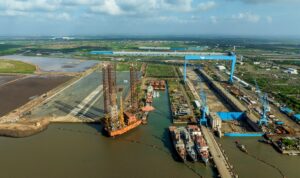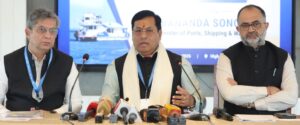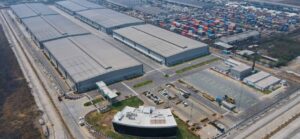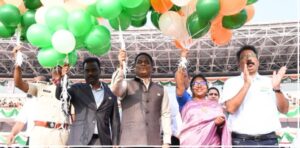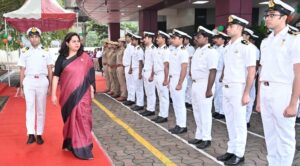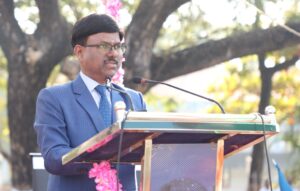Prime Minister Modi Says India’s Coastlines Will Become Gateways to Nation’s Prosperity
New Delhi:
Port Wings News Network:
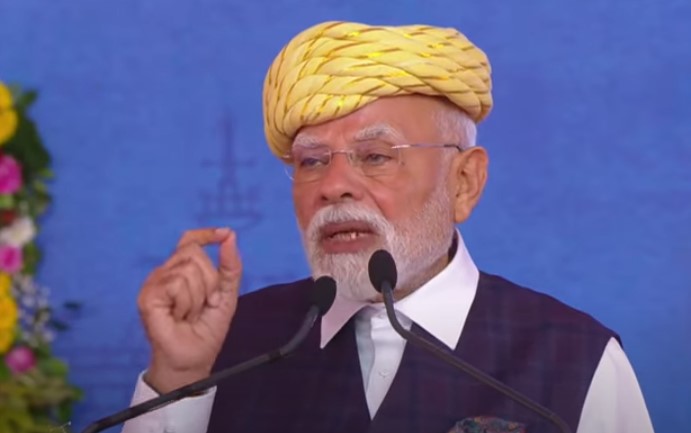 Prime Minister Narendra Modi on 20 September 2025 inaugurated & laid the foundation stone of development works worth over Rs 34,200 crore in Bhavnagar, Gujarat.
Prime Minister Narendra Modi on 20 September 2025 inaugurated & laid the foundation stone of development works worth over Rs 34,200 crore in Bhavnagar, Gujarat.
Addressing the ‘Samudra se Samriddhi’ event, Prime Minister welcomed all the dignitaries and the people.
In this celebratory atmosphere, the Prime Minister highlighted that the nation is celebrating a grand festival of Samudra se Samriddhi. He emphasized that 21st-century India views the ocean as a major avenue of opportunity.
Modi informed that projects worth thousands of crores have just been inaugurated and foundation stones laid to accelerate port-led development. He added that to promote cruise tourism, the International Cruise Terminal in Mumbai has also been inaugurated.
The Prime Minister noted that development projects linked to Bhavnagar and Gujarat have also commenced and extended his heartfelt wishes to all citizens and the people of Gujarat.
Emphasizing that this dependency must be collectively defeated, Modi stated: “India is moving forward with the spirit of global brotherhood and India has no major enemy in the world today, but in true terms, India’s biggest adversary is dependence on other nations.” He reiterated that greater foreign dependence leads to greater national failure. For global peace, stability, and prosperity, the world’s most populous country must become self-reliant.
Underscoring that India has never lacked capability, Modi remarked that “after independence, the then ruling party consistently ignored the country’s inherent strengths. As a result, even after six to seven decades of freedom, India could not achieve the success it truly deserved.”
The Prime Minister identified two major reasons for this: prolonged entanglement in the license-quota regime and isolation from global markets. He added that when the era of globalization arrived, the then ruling governments focused solely on imports, which led to scams worth thousands of crores. Modi emphasized that these policies caused significant harm to India’s youth and prevented the nation’s true potential from emerging.
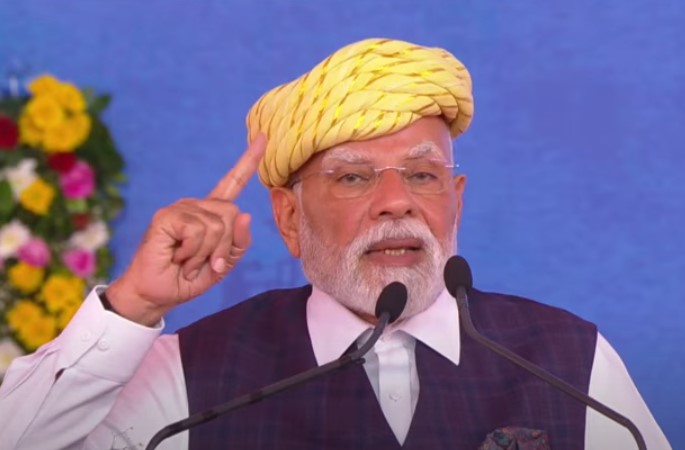 Citing India’s shipping sector as a major example of the damage caused by flawed policies, Modi remarked that “India was historically a leading maritime power and one of the world’s largest shipbuilding hubs. Ships built in India’s coastal states once powered domestic and global trade. Even fifty years ago, India used domestically built ships, with over 40 percent of import-export conducted through them.”
Citing India’s shipping sector as a major example of the damage caused by flawed policies, Modi remarked that “India was historically a leading maritime power and one of the world’s largest shipbuilding hubs. Ships built in India’s coastal states once powered domestic and global trade. Even fifty years ago, India used domestically built ships, with over 40 percent of import-export conducted through them.”
The Prime Minister criticized the current opposition party stating that the shipping sector later fell victim to their misguided policies and instead of strengthening domestic shipbuilding, they preferred paying freight to foreign vessels. “This led to the collapse of India’s shipbuilding ecosystem and forced dependence on foreign ships. As a result, the share of Indian ships in trade dropped from 40 percent to just 5 percent,” he added.
The Prime Minister emphasized that today, 95 percent of India’s trade relies on foreign ships—a dependency that has caused significant loss to the nation.
Presenting some figures before the nation, Modi remarked that citizens will be shocked to know that India pays nearly $75 billion —approximately six lakh crore rupees—every year to foreign shipping companies for shipping services.
He urged the public to imagine how much money has been paid as freight to other countries over the past seven decades. He pointed out that this outflow of funds has created millions of jobs abroad. Modi emphasized that if even a small portion of this expenditure had been invested by earlier governments in India’s shipping industry, the world today would be using Indian ships, and India would be earning lakhs of crores in shipping services.
Remarking that India’s maritime sector is now moving towards next-generation reforms, Modi announced that from today, all major ports in the country will be freed from multiple documents and fragmented processes.
Modi stated: “The implementation of ‘One Nation, One Document’ and ‘One Nation, One Port’ Process will simplify trade and commerce.”
Modi highlighted that during the recent Monsoon Session, several outdated laws from the colonial era were amended.
He informed that a series of reforms have been initiated in the maritime sector, and five maritime laws have been introduced in a new form. These laws will bring major changes in shipping and port governance.
Underlining that India has been an expert in building large ships for centuries, the PM remarked that next-generation reforms will help revive this forgotten legacy. He highlighted that in the past decade, more than 40 ships and submarines have been inducted into the Navy, and barring one or two, all have been built in India. He noted that the massive INS Vikrant was also constructed domestically, including the high-quality steel used in its production. Shri Modi emphasized that India possesses the capability and lacks no skill. He assured the nation that the political will required to build large ships is firmly in place.
Highlighting that a historic decision was taken yesterday to strengthen India’s maritime sector, Modi announced a major policy reform under which large ships have now been accorded infrastructure status. He remarked that when a sector receives infrastructure recognition, it gains significant advantages.
The PM highlighted that shipbuilding companies will now find it easier to secure loans from banks and will benefit from reduced interest rates. All benefits associated with infrastructure financing will now be extended to these shipbuilding enterprises.
Modi emphasized that this decision will reduce the financial burden on Indian shipping companies and help them compete more effectively in the global market.
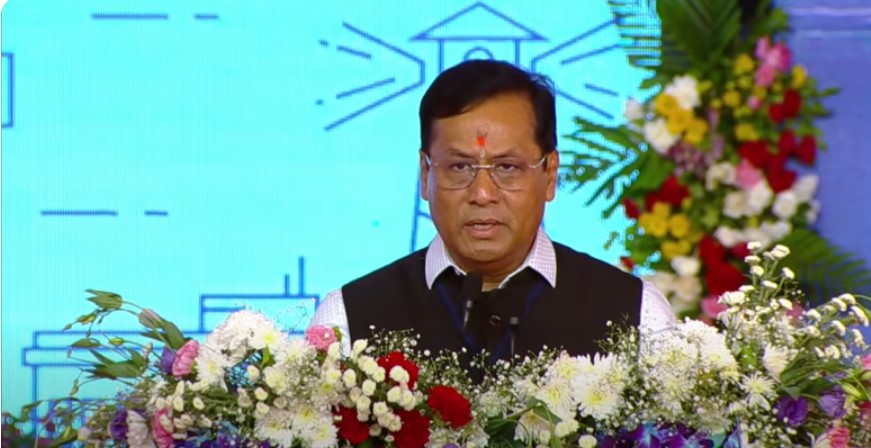 Emphasising that to make India a major maritime power, the Government is working on three major schemes, the PM remarked that these initiatives will ease financial support for the shipbuilding sector, help shipyards adopt modern technology, and improve design and quality standards. He informed that over ₹70,000 crore will be invested in these schemes in the coming years.
Emphasising that to make India a major maritime power, the Government is working on three major schemes, the PM remarked that these initiatives will ease financial support for the shipbuilding sector, help shipyards adopt modern technology, and improve design and quality standards. He informed that over ₹70,000 crore will be invested in these schemes in the coming years.
Recalling that in 2007, during his tenure as Chief Minister of Gujarat, a major seminar was held in Gujarat to explore shipbuilding opportunities, Modi remarked that it was during that period that Gujarat extended support to develop a shipbuilding ecosystem.
He stated that India is now taking comprehensive steps to promote shipbuilding nationwide. He emphasized that shipbuilding is not an ordinary industry; it is globally referred to as the “Mother of All Industries” because it drives the growth of multiple allied sectors.
The Prime Minister highlighted that industries such as steel, machinery, electronics, textiles, paints, and IT systems are all supported by the shipping sector. He noted that this creates significant benefits for small and medium enterprises (MSMEs).
Citing research, the Prime Minister stated that every rupee invested in shipbuilding generates nearly double the economic return. He added that every job created in a shipyard leads to six to seven new jobs in the supply chain, meaning 100 shipbuilding jobs can result in over 600 jobs in related sectors, underscoring the massive multiplier effect of the shipbuilding industry.
Prime Minister further stated that focused efforts are being made to strengthen the essential skill sets required for shipbuilding. He remarked that India’s Industrial Training Institutes (ITIs) will play a key role in this initiative, and the Maritime University’s contribution will be further expanded.
Modi highlighted that in recent years, new frameworks have been developed through coordination
Modi highlighted that the objectives set eleven years ago for port-led development are now being met with remarkable success. He informed that large ports are being developed across the country to accommodate large vessels, and connectivity is being enhanced through initiatives like Sagarmala.
Noting that in the past eleven years, India has doubled its port capacity, Modi highlighted that prior to 2014, the average ship turn-around time in India was two days, whereas today it has been reduced to less than one day.
He informed that new and large ports are being constructed across the country. He remarked that recently, India’s first deep-water container trans-shipment port has commenced operations in Kerala. Additionally, the PM announced that the Vadhavan Port in Maharashtra is being developed at a cost exceeding ₹75,000 crore, and it will rank among the top ten ports in the world.
Mentioning that India currently accounts for 10 percent of global maritime trade, Modi emphasized the need to increase this share and declared that by 2047, India aims to triple its participation in global sea trade—and will achieve it.
The Prime Minister remarked that as maritime trade expands, the number of Indian seafarers is also rising. He described these professionals as hardworking individuals who operate ships, manage engines and machinery, and oversee loading and unloading operations at sea. A decade ago, India had fewer than 1.25 lakh seafarers, but today, that number has crossed three lakh.
Modi highlighted that India now ranks among the top three countries globally in supplying the highest number of seafarers and added that India’s growing shipbuilding industry is also strengthening global capabilities.
Underscoring that India possesses a rich maritime heritage, symbolized by its fishermen and ancient port cities, Modi remarked that Bhavnagar and the Saurashtra region are prominent examples of this legacy. The Prime Minister emphasized the importance of preserving and showcasing this heritage for future generations and the world. He announced that a world-class maritime museum is being developed at Lothal, which, like the Statue of Unity, will become a new symbol of India’s identity.
“India’s coastlines will become gateways to national prosperity”, exclaimed the Prime Minister. He expressed happiness that Gujarat’s coastline is once again proving to be a boon for the region.
He remarked that this entire area is now setting a new benchmark for port-led development in the country. Modi highlighted that 40 percent of the cargo arriving via sea routes in India is handled by Gujarat’s ports and these ports will soon benefit from the Dedicated Freight Corridor, which will enable faster movement of goods to other parts of the country and further enhance port efficiency.
Modi stated that a robust ship-breaking ecosystem is emerging in the region, with the Alang Ship Breaking Yard serving as a prime example. He remarked that this sector is generating significant employment opportunities for the youth.
Governor of Gujarat, Acharya Devvrat, Chief Minister of Gujarat, Bhupendrabhai Patel, Union Ministers, C. R. Patil, Sarbananda Sonowal, Dr. Mansukh Mandaviya, Shantanu Thakur, Nimuben Bambhaniya were present among other dignitaries at the event.
Details of Projects, inaugurated & laid foundation
In a major boost to the maritime sector, Prime Minister inaugurated and laid the foundation stone for multiple development projects related to the maritime sector worth over Rs 34,200 crore.
He inaugurated the Mumbai International Cruise Terminal at Indira Dock. He laid the foundation stone of a new container terminal and associated facilities at Syama Prasad Mookerjee Port, Kolkata; new container berth, cargo handling facilities, and associated developments at Paradip Port; the Tuna Tekra Multi-Cargo Terminal; firefighting facilities and modern road connectivity at Kamarajar Port, Ennore; coastal protection works including sea-walls and revetments at Chennai Port; sea-wall construction at Car Nicobar Island; a multi-purpose cargo berth and Green Bio-Methanol Plant at Deendayal Port, Kandla; and ship repair facilities at Patna and Varanasi.
In line with his commitment to holistic and sustainable development, Prime Minister inaugurated and laid the foundation stone of multiple projects of the central and state government, worth over Rs 26,354 crore, catering to various sectors in Gujarat. He inaugurated HPLNG Regasification Terminal at Chhara Port, Acrylics & Oxo Alcohol Project at Gujarat IOCL Refinery, the 600 MW Green Shoe Initiative, PM-KUSUM 475 MW Component C solar feeder for farmers, the 45 MW Badeli Solar PV Project, complete solarization of Dhordo village among others. He laid the foundation stone of LNG infrastructure, additional renewable energy projects, coastal protection works, highways, and healthcare and urban transport projects, including expansions at Sir T. General Hospital in Bhavnagar, Guru Govind Sinh Government Hospital at Jamnagar, and the four-laning of 70 km of national highways.











